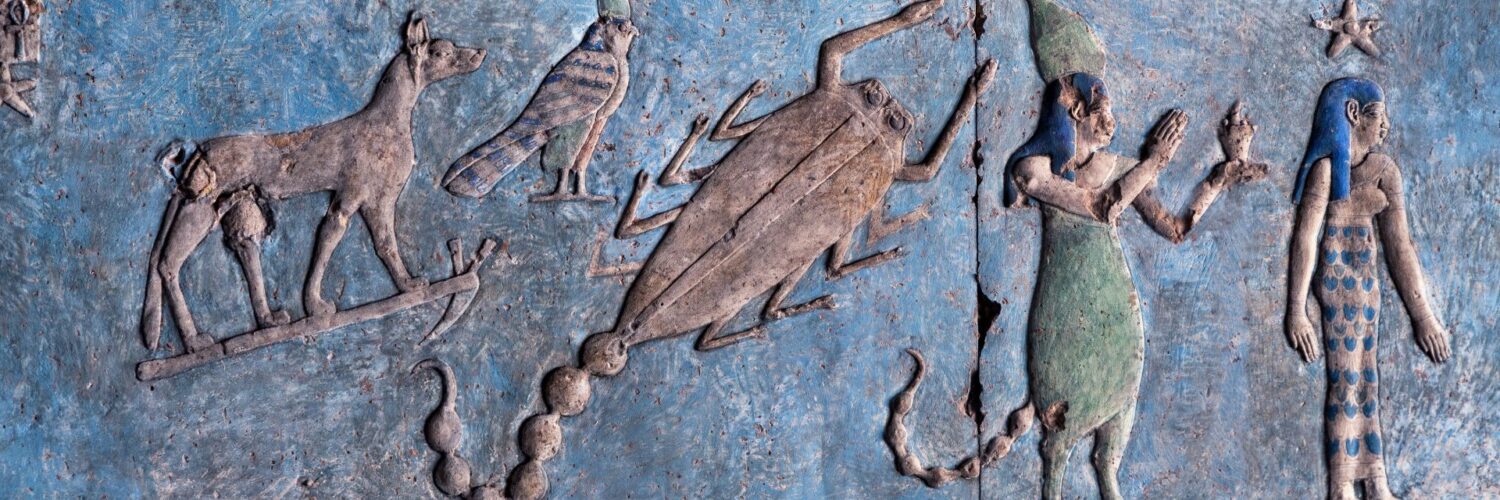探索冥王星與天蠍座、釐清海王星與雙魚座
我認為,現今占星學中對於天蠍座與雙魚座的理解,已經因為將其特質錯誤地歸於冥王星與海王星而受到扭曲。我們讓天蠍座與雙魚座脫離了日常生活的範疇,過度地向極端或超自然的領域靠攏,而那些通常並不是人們實際生活的地方。
書本中的描述,與我在占星諮詢中看到的真實個案,往往有明顯落差。多數天蠍座能量強的人,並不執著或沉迷於死亡,而是性格內斂也積極投入生活;多數雙魚座特質強的人,也並非總是活在夢中,而是對世界充滿好奇,甚至會注意細節,並以多樣的方式回應生活。
去年,我曾撰文反對將宮位、星座與行星以「十二字母法」(Twelve Letter Alphabet)強行對應。接著,在〈讓天王星與水瓶座彼此解放〉(Liberating Aquarius and Uranus)一文中,我質疑了現代將水瓶座與天王星綁定的做法。本文則是與前述兩篇文章相呼應的第三篇。
當外行星天王星、海王星與冥王星相繼被發現後,便很快地被納入占星學體系中。當時的占星家變更了傳統星座主管權的架構。
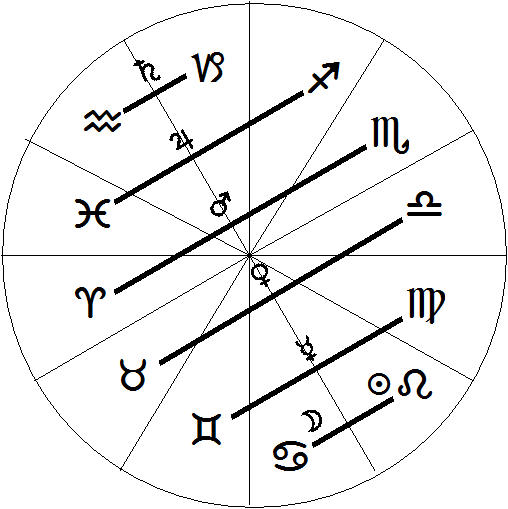
過去,太陽與月亮分別主管獅子座與巨蟹座,其餘五顆「可視行星」(starry planets)則各自主管兩個星座(見右圖)。改動後的版本,天王星取代了土星,成為水瓶座的廟主星;海王星取代木星,成為雙魚座的廟主星;冥王星則取代火星,成為天蠍座的廟主星。
現今有些占星師僅使用傳統主星,有些只使用現代主星,還有些則主張「共主星」。自我成為占星師後不久,我便始終只採用傳統主星來對應水瓶座、天蠍座與雙魚座。
近幾十年來,占星界流行將宮位、行星與星座彼此對應,形成所謂「十二字母法」,把十二宮、十二星座與其廟主星視為「字母表」中的十二個字母。於是,天王星與水瓶座被對應到第十一宮,海王星與雙魚座對應到第十二宮,冥王星與天蠍座對應到第八宮。去年,我曾撰文反對這種對應方式(見本系列第一集)。
2015 年初,我主張應當解除天王星與水瓶座之間的綁定關係,因為這種配對會讓兩者的描述陷入自相矛盾(見第二集)。本文作為最終篇,將討論範圍擴展至天蠍座與冥王星、雙魚座與海王星的配對問題。
有個充分的理由足以說明為什麼不該讓外行星擔任星座的主管星:外行星不存在「失勢」(debilitated)。
內行星會受到所在星座環境的影響——例如,月亮位在金牛座(入旺)會因受到滋養而提升力量;落在天蠍座(入弱)則會受限,但外行星完全不同,它們在一個星座中停留多年,既不會因星座而增強,也不會被削弱。套句老笑話:外行星就像一頭八百磅的大猩猩,牠想坐哪就坐哪。
外行星的所在星座,主要反映的是一種歷史或世代性的影響;只有當它與個人行星產生相位關聯時,才會對個人產生作用。所以,如果你看到某張表格也將外行星列出了—廟、旺、弱、陷—的位置,那就直接翻頁或關閉該文件吧。
冥王星:黑暗而堅實的行星
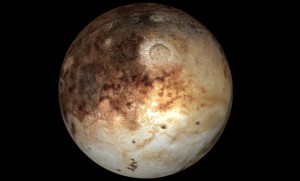
2015年7月,美國太空總署(NASA)的探測器飛掠冥王星,拍下大量影像。撰寫本文時,相關數據仍在分析中。飛掠期間,我們得以窺見冥王星表面佈滿崎嶇不平的痕跡,矗立著巨大的冰山,並擁有某種形式的大氣層。就象徵意義來說,冥王星堅硬岩石的地貌顯示它與氣態巨行星——木星至海王星——屬於完全不同的類型。與其說它像鄰近的天王星與海王星,不如說它的性質與象徵意義更接近那顆更加遙遠的鬩神星(Eris)—這顆星體以希臘神話中的不和女神命名,發現時間也更晚。至於四顆氣態巨行星的關聯性,我會在討論海王星時再加以說明。
上一世代的占星師對冥王星的描述相當一致——它被視為一顆與冥界、死亡與權力相關的黑暗行星。舉例來說,astro.com 的解釋是:「冥王星揭示了我們如何面對權力,不論是個人或非個人的——承受他人的權勢,或是運用自身的權力。它顯示我們如何面對魔性與神秘力量、我們的再生能力,以及進行徹底改變與重生的能力:那種死亡與重生的循環。」現代占星的討論中,常將冥王星與「轉化」(transformation)的主題緊密連結。
在現代語境裡,人們很容易將生活中的重大變化——例如感情狀態的轉變、職業的更換、搬遷,甚至只是開始參加每週二晚上的瑜伽課——都稱作「轉化」。然而,這些改變多半屬於日常生活與成人發展過程中的一環,通常是在既有的框架內發生的,因此更接近「第一層級的改變」(first order change):雖然有變動,但整個生物體或個體性仍保持連續性。這樣的改變,並不是占星學中所描述的冥王星。
「轉化」一詞的定義,是形態、樣貌或外觀的改變,其希臘語的對應詞是「變形」(metamorphosis)。正如奧維德(Ovid)那首著名詩作《變形記》,變形並不總是朝著更好的方向發展。事實上,在我們的生命中真正的正向轉化是相當罕見的。
 大多數真正的轉化或蛻變,往往源於足以撼動人生根基的事件——例如瀕死經驗、與天使或外星人的相遇、戰爭、監禁、成為暴力犯罪的受害者、自然災害、嚴重的經濟崩潰、威脅生命的疾病或殘疾,或是失去摯愛與家園的悲劇,就像日本曾經歷的海嘯與核災,或美國卡崔娜颶風的襲擊。今年的新聞中,也充斥著中東與北非難民乘船逃往歐洲的故事,以及那些選擇留在家園的人所遭遇的處境。
大多數真正的轉化或蛻變,往往源於足以撼動人生根基的事件——例如瀕死經驗、與天使或外星人的相遇、戰爭、監禁、成為暴力犯罪的受害者、自然災害、嚴重的經濟崩潰、威脅生命的疾病或殘疾,或是失去摯愛與家園的悲劇,就像日本曾經歷的海嘯與核災,或美國卡崔娜颶風的襲擊。今年的新聞中,也充斥著中東與北非難民乘船逃往歐洲的故事,以及那些選擇留在家園的人所遭遇的處境。
在這些情境中,我們直面生命的脆弱本質,有時甚至會感受到邪惡的逼近——包括潛藏在我們自身之中的那一部分。這些改變往往並非自願,而是更接近所謂的「命運」。
這類事件之後,我們可能罹患創傷後壓力症候群(PTSD),或是出現其他各種症狀與負面影響,也可能像托爾金(Tolkien)或《哈利波特》系列中的幽魂般,內在被掏空;反之,有些人因此激發了創造力與卓越才華,成為值得欽佩、甚至敬仰的「勝利者人格」。
對於這些戰勝苦難的人而言,駭人的人生經歷成為靈性開啟的契機。然而,這種正面結果極為罕見,且往往伴隨著一種徹底接受現實——接受生命再也無法回到過去的常態。
也有一些是出於自願的轉化,其觸發點往往是在思索自己與摯愛終將面對死亡的時候,所觸及的那份簡單而深刻的真相:我們與所知的一切,本質上都「站在死亡的門前」。因此,許多重要的靈修途徑,無不始於強調人生的無常與短暫性,強調我們本質上的脆弱。
唯有如此,我們才能將「命運」轉化為「使命」;如能承受這般觀點上的轉變,也才可能帶來冥王星所象徵的深刻轉化。
冥王星象徵「他者」、異質的存在以及宇宙的冷漠。正是這般特質,為真正的轉化鋪設了舞台。當我們從冥界的角度觀察冥王星時,這些主題仍將持續浮現。
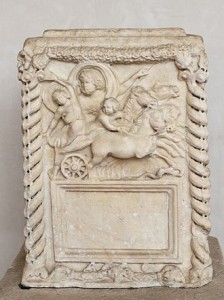
參考文學中對冥界的描繪以及它在古代敘事中的地位,能為我們帶來一些重要的洞見,並讓我們想起《奧德賽》(Odyssey)第十一卷與《埃涅阿斯紀》(Aeneid)第六卷中,奧德修斯(Odysseus)與埃涅阿斯(Aeneas)的冥界之旅。在這兩部史詩中,英雄下到冥界,藉此獲得內在的連結與力量,更深的理解以及使命感——而他們確實需要這些力量。
從冥界歸來後,奧德修斯與埃涅阿斯都遭遇了災難,但兩人都已經具備承受逆境的能力,能夠挺過即將到來的風暴,並最終抵達彼岸。在古代史詩的傳統中,最受重視的預言,往往來自冥界,因為這個領域所揭露的是——赤裸,且令人不安的真相。
當占星師說:「本命冥王星顯著時,即代表此人的人生將充滿轉化」,那其實是錯判。事實上,無論冥王星位在哪裡,大多數人都會抗拒真正的轉化。一般而言,冥王星並不會轉化我們,因為我們往往不喜歡太多的「轉化」,甚至連改變也不喜歡。
那麼我們應該如何看待本命星盤中的冥王星?與其關注冥王星的所在星座,不如觀察它與星盤四軸點(特別是上升點與上中天)以及移動快速的個人行星之間的相位,尤其是合相、對分相與四分相。如此,冥王星在本命星盤中的顯著位置,便能揭示一段冥界之旅或轉化契機的內容與方向——儘管那些經歷最終並未實質性地增強我們的力量或理解。
流運冥王星扮演著矯正我們膚淺安逸狀態的角色,它有時帶來更深的理解與使命感,但並非一定如此。別忘了,流運終究是暫時的,它反映的是人生情境的變化,並不保證會帶來持久的成長或正面的轉化。
溫和版的天蠍座
根據 2003 年 NCGR 學習指南中對天蠍座的關鍵詞描述如下:「強烈、敏銳、神秘、嫉妒、內省、熱情、意志堅定、佔有欲強;渴望親密;死亡與再生」(第18頁)。這些詞彙幾乎成了描述天蠍座的慣用語。我曾遇過一位剛學占星的學生,他跑去問另一位天蠍座很突顯的同學:「天蠍座是不是邪惡的?」
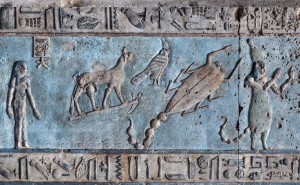 即使是那些立場較為中立,強調天蠍座具有轉化特質的人,也常不自覺落入另一種分類的陷阱——將天蠍座分為「尚未進化、傾向邪惡」的類型,以及「已進化、擁有足夠影響力改變世界」的類型。世上確實有些人是邪惡的,也有些人能對世界產生正面影響;但這些特質在天蠍座身上真的比其他星座更常見嗎?
即使是那些立場較為中立,強調天蠍座具有轉化特質的人,也常不自覺落入另一種分類的陷阱——將天蠍座分為「尚未進化、傾向邪惡」的類型,以及「已進化、擁有足夠影響力改變世界」的類型。世上確實有些人是邪惡的,也有些人能對世界產生正面影響;但這些特質在天蠍座身上真的比其他星座更常見嗎?
我所認識的大多數天蠍特質明顯的人,他們有工作、感情關係、家庭、個人志向與困境,也會擔心健康問題。他們和其他人沒什麼不同。本質上,天蠍座並不比黃道帶上的其他星座更難相處。
我們應該重新出發,改以三個簡單的占星分類來描述天蠍座:模式(固定)、元素(水)與傳統主管行星(火星的陰性面向),這將幫助我們更清楚理解天蠍座的本質與特質。
「固定」的部分非常直白──和其他固定星座一樣,天蠍座踏實穩固、堅持到底,無論境況如何都緊守立場。這份堅毅可能化為英雄般的耐力,也可能成為超越理性界線的執拗。我印象很深,有位天蠍特質極重的客戶,五顆行星都在天蠍座,她說自己對人的第一印象一旦形成就永不改變(幸好我應該是給了她好印象)。固定的天蠍座確實會緊抓不放——不過在我看來,天蠍座抓住的是「生命」,而非死亡。
水元素帶有向下流動的特質,因其本身沒有容器,形態千變萬化。它與情感世界更為契合,但不必然被情緒左右。水象與土象星座被稱為陰性星座,它們的能量自然傾向內斂、更為安靜且更加隱密的表達方式。
相比對向的土象金牛,天蠍座的情感層次往往更加深沉,並且擁有與四分相星座——獅子座與水瓶座——截然不同的內在視角。獅子座重視外在表現,水瓶座則偏重概念;反之,天蠍座可能將注意力深繫於情感的回應以及生命更加隱秘的內在維度。
 火星在其陰性星座的廟位,強化了水元素的下沉力量與固定模式。那麼,什麼是陰性火星?它不是白羊座的那種外放、躁動的火星,而是更安靜、細膩、深藏不露且滲透力強的火星。
火星在其陰性星座的廟位,強化了水元素的下沉力量與固定模式。那麼,什麼是陰性火星?它不是白羊座的那種外放、躁動的火星,而是更安靜、細膩、深藏不露且滲透力強的火星。
古代占星家認為,火星在天蠍座比在白羊座更具優勢——行事有計劃、講究策略,且有效率。身處團體時,他們能敏銳察覺幕後的角力、嫉妒與吸引之間的暗流,還有對競爭者的靜默打擊——這些情況在董事會、瑜伽館的討論室、冥想中心,甚至在占星組織裡都不罕見。
天蠍座的火星非常擅長應對這種情境,並在情緒不受干擾的情況下,精準且適時地行動。他們也擅長策劃反擊,並且如同《基督山恩仇記》(法語:Le Comte de Monte-Cristo)的主角,暗中耐心地準備復仇。這些特質並非來自冥王星,而是來自不同樣貌的火星。
馬丁.路德作為天蠍座的典範
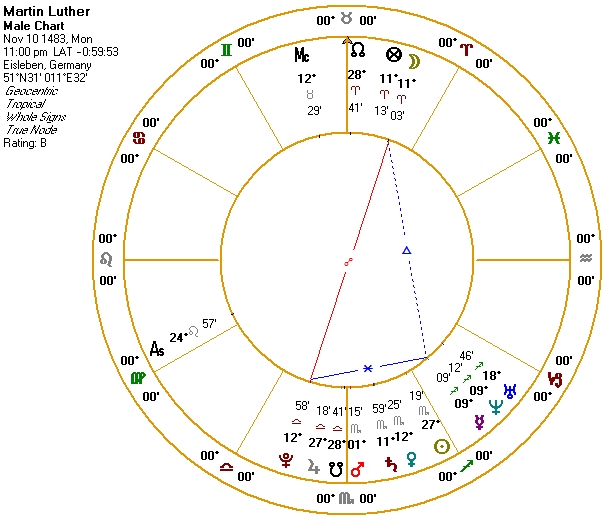
若將冥王星與天蠍座分開理解,馬丁.路德(Martin Luther)的本命星盤及其一生經歷,都能同時呈現這兩種特質。眾所皆知,他是十六世紀的德國修士與威登堡大學神學教授,因公開反對天主教會的部分實踐及其神學基礎,而成為宗教史上的關鍵人物。在德國諸侯以及對於將資金用於資助義大利文藝復興頗有怨言的民眾支持下,他推動了影響深遠的宗教改革。
分析路德的冥王星時,首先得看他的月亮與水星,因為外行星的意義需透過與內行星的相位才能凸顯。他的月亮與水星皆位在火象星座,月亮在白羊座(位於象徵宗教的第九宮,並與幸運點合相),賦予他即便在傳統宗教的環境中,也保有衝動行動與開創的天性。在他人生的不同階段,他多次必須快速應對突變的情勢,而他的直覺多半能引領他做出正確的判斷。
就個人轉化的潛能而言,路德似乎充分發揮了冥王星的力量。艱難的童年與對基督教教義的虔敬,使他得以深入探究教義的根本意義,並將其落實於生活之中,這讓他從一個相當神經質傾向的年輕人,蛻變為開創新生活方式的先驅人物。冥王星這顆緩慢移動、同時能反映個人與時代交匯的行星,也促使路德與歐洲更廣泛的政治局勢,以及現代思想變革的黎明浪潮接軌。
 (水星緊鄰海王星,使他能掙脫自小養成的僵化觀念,走上神學革新的道路;但也讓他對幻覺與靈異經驗特別容易感應。)
(水星緊鄰海王星,使他能掙脫自小養成的僵化觀念,走上神學革新的道路;但也讓他對幻覺與靈異經驗特別容易感應。)
路德在人生與事業的多個面向中,都展現出濃烈的天蠍特質。太陽天蠍主管他的上升獅子。他從未把自己當作公眾人物,而是將個人名聲全然地置於更高的使命之下。金星與土星在天蠍座的合相,正好呼應他年輕時對自身性慾的困惑,以及後來對神職人員婚姻制度的倡導。
火星入廟天蠍座,本命太陽、金星與土星的廟主星,同時也主管九宮內的月亮白羊。從他的早年可以看出,他逐步醞釀對天主教教義的質疑,最終形成了一套完整且足以取代天主教傳統的思想。一旦成為公開批評教會的人物,他便專注且勇敢地追隨自己的目標,並在過程中逐漸從忠誠的改革倡議者,轉變為宗教革命者。路德的天蠍特質,清楚展現了固定星座、水元素以及由陰性面向的火星所主管的特質。冥王星則是截然不同。
接下來,讓我們將焦點轉向海王星與雙魚座。
海王星的力量
海王星是氣態巨行星中最外側的一顆,是從木星開始,經土星、天王星一路延伸的最後一顆。象徵意義上,氣態巨行星依序擴展了我們生命的視野,引領我們從傳統走向形而上的領域,從個人意識邁向超個人意識。與冥王星相似,氣態巨行星與宏觀的歷史發展及世代趨勢息息相關。
木星是四顆氣態巨行星中離我們最近、運行最快的一顆,也因為是「大吉星」而最廣為人知。它將人生的視野從個人擴展到社群與部族,或從地方層次延伸到國族乃至全球。具有木星特質的人,經常藉由宗教與哲學來追尋更宏大的真理,不過這種追求依舊是在既定的社會文化環境下進行。木星象徵優秀的公民精神,行事遵循傳統規範,同時也與財富累積(非金星)及社群福祉的發展有關。
土星也能拓展人的視野與邊界,但其方式與木星所帶來的愉悅感截然不同。作為哀愁與沉思的行星,土星在其最理想的表現下,能強迫我們遠離自我沉溺與自滿,迫使我們擺脫拖延與舒適區。大多數人會迴避土星所發出的召喚,而這也使得土星對我們而言成了「大凶星」——成了負擔與現實壓迫的化身。
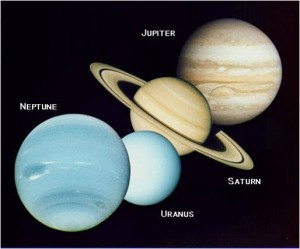 天王星作為第一顆肉眼不可見的行星,是個氣質迥異的異數,象徵天才、直覺,以及能宏觀思考的高階心智。它帶領我們衝破預期,迫使我們拋下陳舊假設;它讓我們短暫地瞥見「當下」所蘊含的轉化力量——即使我們往往撐不過半分鐘就失去這份專注。正如本系列第二集所討論的,固定星座的水瓶座,並無法真正跟得上天王星的驟變與天才閃現。
天王星作為第一顆肉眼不可見的行星,是個氣質迥異的異數,象徵天才、直覺,以及能宏觀思考的高階心智。它帶領我們衝破預期,迫使我們拋下陳舊假設;它讓我們短暫地瞥見「當下」所蘊含的轉化力量——即使我們往往撐不過半分鐘就失去這份專注。正如本系列第二集所討論的,固定星座的水瓶座,並無法真正跟得上天王星的驟變與天才閃現。
終於,我們來到海王星——那顆遙遠而湛藍的氣態巨星。它揭露現實如夢的真相,瓦解了傳統的現實觀,並可能為我們打開通向無垠世界的大門。
海王星能引導我們超越那種將自身與世界視為界限分明、有明確標籤、甚至有「真實存在」的思維傾向。這種敞開,也許能讓我們更接近神性,賦予我們想像並實踐全新可能的能力,但同時也可能引誘我們陷入解離、否認、沉溺於幻夢、逃避的幻想與妄想。海王星象徵著「超越」的第一步——跨越界線或實相——但也揭示了當安穩的生活崩解、我們徹底慌亂時的情境。海王星顯著的人往往理想主義、具有願景,但有時也會誤入歧途,或墮落到不可思議的地步。
在占星學上,什麼樣的情況才算是一顆顯著的海王星?如同冥王星,當海王星與本命星盤四軸點或與移動快速的個人行星(如太陽、月亮、水星、金星、火星)形成相位,即揭示了人生中可能受其影響的面向——無論是好是壞。前文探討馬丁.路德的本命星盤時,我們已經看到了海王星的這類作用。
流運海王星往往極具挑戰性,有時我會稱它是「最大凶星」。在這些時期,心智與情緒容易陷入混亂、妄想,甚至出現解離的狀況。雖然靈性的開啟也可能發生,但通常只有那些早已為此做過準備的人,才能真正迎來它。
入世的雙魚座
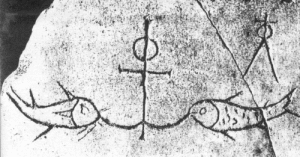
雙魚座是一個星座,而非行星,它的本質與海王星屬於不同的層面。作為黃道十二星座之一,雙魚座的影響主要落在世俗層面(worldly),而不是超脫塵世(otherworldly)的領域。
雙魚座並非通向超越或幻象的大門,而只是人類十二種存在方式中的一種,其具體特質取決於有哪些行星或軸點落在該星座。不幸的是,現代對於雙魚座的描述大多已經被海王星的象徵色彩所滲透,導致扭曲。
為了說明雙魚座的描述是如何逐漸滑向海王星的領域,這裡引用一本我在初學占星時所使用的書——薩科揚(Sakoyan)與阿克(Acker)合著的《占星師手冊》(Astrologer’s Handbook, 1973):
「雙魚座喜歡沉浸在如夢境般的世界,在那裡他們可以忘卻自我……由於海王星——這顆掌管影像的行星——是雙魚座的主管星,他們往往有過於活躍的想像力。他們能感知他人生活中的困境,也能預先察覺言語與行動對他人造成的痛苦……海王星使雙魚座對人類的苦難特別敏感。因此,他們真誠地渴望推動療癒與救助。許多人甚至選擇在最骯髒惡劣的環境中工作,或承擔任何能替他人減輕負擔的事情……」
——摘自薩科揚與阿克合著《占星師手冊》(1973),第59頁
《NCGR認證手冊》中給雙魚座的關鍵字是:「有想像力、無私奉獻、易受影響、富同情心、富憐憫心、幻覺的、隱秘的、加害或受害的。」在這八個形容中,有四個更像是在描述海王星,而非雙魚座。
若回到傳統的基本象徵,雙魚座的本質與行動會更清楚。首先看模式,它不像天蠍座那樣屬於固定星座,而是變動星座:多變、不一致,能展現多種身份、興趣及表現方式。變動星座較不傾向開創,在需要堅持時容易動搖,但對於環境變化卻有高度的適應力。當我們將水元素加入變動星座時,就加入了情感上易受影響,以及對自己與他人內在世界的敏感度。
水元素與變動模式的結合,揭示了生命與生活本身的幻象特質,但並不必然要變得超脫塵世。雙魚座和雙子座相似,只是不那麼有遊戲感。他們會偽裝自己,在不同情境中表現出不同樣貌和個性,甚至對他們自己來說也有幾分神秘。雙魚座能夠完全融入一個環境,之後再轉向另一個環境——這種特質有時是優勢,有時則是缺點。
水象雙魚座與土象變動處女座相對,後者專注於具體情境與實際結果;而與雙魚座形成四分相的雙子座與射手座,則更具意識性、目的性與理性思維。作為變動十字中的水象星座,雙魚座擁有更加敏銳的情感與更深的感知力,但有時會在責任感與行動力上顯得不足。
如同火星在白羊座呈現陽性力量、在天蠍座呈現陰性力量,雙魚座的主管星——陰性木星——也與射手座的陽性木星有所不同。陰性木星較少陷入意識形態與道德裁判,而更傾向於改變觀點與視角,並且敏銳地察覺理念實踐中可能存在的虛偽。這讓雙魚座能以感受與直覺為依據,培養出個人化且充滿同理心的態度,而不是沉迷於拯救世界或將他人改造成自己認為「正確」的幻想之中。
陰性木星的一個最佳例子來自馬克.吐溫(Mark Twain,木星巨蟹在其星盤中占主導地位)所著的小說《哈克貝利·費恩歷險記》(The Adventures of Huckleberry Finn)。小說中,主人公哈克貝利·費恩逃離了充滿虐待的環境,並與逃奴吉姆一起乘坐木筏。哈克貝利從小就知道庇護逃奴既是非法又不道德,但與他同行的是一位與他有個人情感聯繫的人。他曾寫好一封信,打算通報逃奴吉姆的行蹤,但在承認自己找不到任何指控他的理由之後,便決定不寄出那封信:「好吧,那我就下地獄吧!」,隨即撕掉信件。在小說中,他深信自己會因此遭到社會與上帝的譴責,但對他來說,更重要的是對同伴的關心與情義——這使他成為整部小說中,真正的道德核心。
兩位典範人物

這位人物幾乎無需介紹——李奧納多·達文西(Leonardo da Vinci),比馬丁·路德早一代的義大利傳奇「全才」,在藝術、科學、工程方面都成就非凡,而且還是一位頗具水準的音樂家。他的一生幾乎是文藝復興的縮影:始於佛羅倫斯,輾轉至米蘭,後來成為義大利中部切薩雷.波吉亞(Cesare Borgia)的顧問與工程師,晚年則在法國國王麾下度過。我邀請讀者去深入認識他,因為他的傑出人生顛覆了我們對人類能力極限的許多既有看法。
雖然占星學中並沒有「全才」的專屬特徵,但達文西的生涯確實在某些面向顯示出海王星與雙魚座的影響——只是這兩者必須分開來討論。
李奧納多的出生時間有兩種記錄:晚上9點40分,或是晚上10點——若採後者,海王星便與上中天的度數合相。把海王星安置在他的上中天,實在很誘人,不是因為他特別具有靈性——他多半像個世俗明星般行事——而是因為他一生的創作充滿流動性,且總能巧妙地模糊智識與藝術領域的分界。這,就是屬於海王星的那一面。
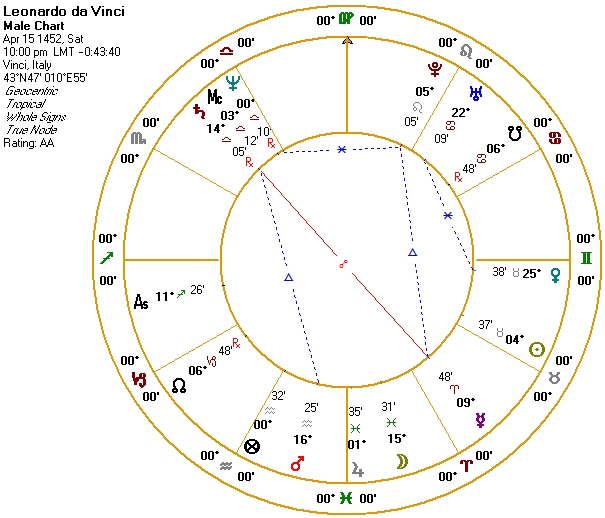
李奧納多的木星位在雙魚座,位於第四宮的角宮位置。木星主管他的上升射手,而月亮也位在雙魚座。無論好壞,他都展現了該星座的許多特質。這顆位於雙魚座的木星,同時主管上升射手與月亮雙魚,對意識形態興趣缺缺,但他確實很能洞察人性,並且天生對他人懷有同理心。
然而,他也帶有水象變動星座那種不受歡迎的習性——拖延、缺乏持續性。他對委託作品的態度是出了名地隨興,常在技術問題被解決、創作熱情消退後,便放下作品,轉向其他領域。這種喜歡嘗試不同事物的傾向,導致許多作品都未能完成。
從他的藝術作品中,我們可以看見他對「人性」極其敏銳;這種情感上的細膩,為下一世紀肖像畫的盛行奠定了基礎。他的畫風強調的不是輪廓與背景的清晰對比,而是氛圍的主導性。這便帶有月亮雙魚的氣息。(有趣的是,他的月亮即將六分入相位金星金牛,並非巧合。)
儘管如此,在某些領域——例如擔任軍事工程師時——他卻展現了極為務實的一面。細看他的月亮雙魚,會發現它與一顆入旺的土星形成映點(對稱於巨蟹–摩羯軸)。對他而言,土星的力量體現在他忠於「從工作中學到的知識」,而非衷於作品本身,或那些富有且人脈寬廣的贊助人。

接下來這位雙魚座人物同樣堪稱典範,但表現上完全不同。美國總統亞伯拉罕·林肯(Abraham Lincoln)在1860年代美國南北戰爭期間執政,最後卻遭遇不幸。在所有美國歷史人物中,林肯的生平紀載最為詳盡、著述最多。遺憾的是,關於他的出生時間,我們只知道「大約在日出時」。無論如何,這裡還是附上他的星盤。
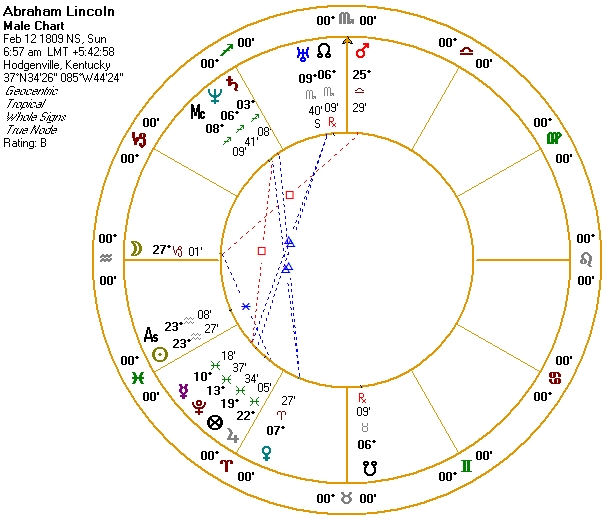
我想特別關注他在總統任內,如何在戰爭壓力中思想愈發深邃,語言與觀點的表達也日益精準有力。他帶領國家走到戰爭終結,卻在勝利後遭暗殺。這樣的成就與際遇,讓我們自然而然將目光放在水星——那顆掌管思想、語言與訊息的行星。
林肯的水星有個獨特之處,它同時與三顆外行星皆有相位——它與天王星形成三分相、與海王星形成四分相,並且逐漸接近冥王星與之合相。這些影響固然強烈,但若沒有水星自身條件的支撐,力量終究淺薄。他的水星運行快速,剛離開太陽光束,與太陽相距17度,表示它在西方低空可見。這顯示他具備獨立且強大的思考能力,但光靠這點仍不足以完整描述他水星的真正特質。
在雙魚座,水星處於落陷與入弱的狀態,若翻開先天尊貴(essential dignities)計分表,你會看到水星被整整扣了十四分——對一位臨終演說成為美國文學經典的總統來說,這樣的評分似乎有些不公。按照雙魚座「變動+水元素」的組合,林肯的水星帶有非直線式的思考、容易受情感影響,並且具備充沛的想像力。這些特質在某些情況下會成為弱點:南北戰爭初期,他經常顯得優柔寡斷、反覆猶豫。就軍事領導而言,他也並非頂尖;富蘭克林.羅斯福(Franklin Roosevelt)在這方面要更勝一籌,而林肯又不像羅斯福那樣擁有溫斯頓.邱吉爾(Winston Churchill)這位「自封的摯友」作為後盾。
林肯的星盤顯示,木星雙魚與幸運點合相,並且是水星的定位星(dispositor)。此時,一切線索逐漸拼湊成形:這顆木星(尤其與金星形成反映點〔contra-antiscion〕關係)賦予他高度的敏感度與情感深度,並且使他能以動人的方式闡述國家使命——這並不是源於僵固的信念體系,而是隨時間成長與轉化的理解。林肯能夠從個人視角去思考歷史與國家(這是陰性木星的特質),他的情感共鳴源自雙魚座對人性的深度敏感。雖然他並非虔誠的宗教人士,卻能巧妙地運用當時主流的基督宗教,為自己帶來慰藉,並且從中提煉出意義來回應他所面對的國難。他將自身的苦難(如時常發作的憂鬱、在戰爭中痛失愛子,以及妻子罹患精神疾病)延伸至整個國家人民,甚至擴及內戰的另一方──南方聯邦(the Confederacy)。透過他個人與國家所經歷的劫難,林肯展現了行星位於雙魚座所能展現的最高潛能之一。
對馬丁.路德、李奧納多.達文西與亞伯拉罕.林肯而言,我們若將星座的象徵意義與外行星混為一談,就會錯過那些外行星與內行星形成相位所帶來的深刻意涵,也會忽略內行星位於天蠍座或雙魚座時所隱含的進一步資訊。將象徵意義混合在一起,只會讓占星師的詮釋工作更加困難,也容易錯過星盤中某些重要的層面。
在本系列的第一集文章中,我主張應將星座與它們所謂的「先天宮位」分開看待,也就是不應再將行星、星座與宮位捆綁在一起。在第二篇與本篇(第三篇)中,我則主張應將黃道星座水瓶座、雙魚座與外行星天王星、海王星、冥王星分開考量。唯有如此,我們才能同時從外行星和黃道星座的配置中,獲取最大的詮釋價值。
遺憾的是,許多占星學入門書籍、網站與行星解析,依然使用「十二字母法」及其外行星主管權所建立的對應關係,但在嚴格檢視下,這些關係並無法站得住腳,不僅削弱了占星學在日常生活情境中的應用性,還可能將占星詮釋侷限於心理與靈性(或偽靈性)的層次之中。我希望隨著時間推進,我們能完成一套更完整、更周延的詮釋方式。
作者:約瑟夫・克萊恩(Joseph Crane)
原文網址:Probing Pluto and Scorpio, Clarifying Neptune and Pisces | Joseph Crane’s Astrology Institute
I contend that our astrological understanding of Scorpio and Pisces has been compromised by attributing qualities to those signs that more correctly belong to the outer planets Pluto and Neptune. We have taken Scorpio and Pisces too far out of the realm of everyday life and brought it too close to the extreme and the supernatural, and usually this is not where people live.
There is a gap between what the books tell us about Scorpio and Pisces and the lives of our clients. Most people with prominent Scorpio are not obsessive or focused on death but are self-contained but engaged with life. Most people with prominent Pisces are usually interested in the world around them, even its details, and respond to life in many different ways.
Last year I argued against bringing together houses, signs, and planets according to the “Twelve Letter Alphabet” (PDF file). And in a follow-up article, I looked critically at the modern affiliation of the sign Aquarius with the planet Uranus in Liberating Aquarius and Uranus. This current article is a companion to those two articles.
When the outer planets Uranus, Neptune, and Pluto were discovered they soon made their way into astrology. At that time astrologers changed the traditional pattern of planetary rulers or domiciles of the signs of the zodiac. Previously, Sun and Moon governed the signs Leo and Cancer respectively, then the five starry planets were given two signs each. See diagram on the right. The changed version used Uranus instead of Saturn as domicile ruler for Aquarius, Neptune instead of Jupiter for Pisces, and Pluto instead of Mars for Scorpio.
Today some astrologers use traditional rulers only, some use modern rulers, others use “co-rulers”. Since my very first years as an astrologer I have only used traditional domicile rulers for Aquarius, Scorpio, and Pisces.
Over the past generation it became fashionable to align houses and planets and signs together within a “Twelve Letter Alphabet” so that the twelve houses and twelve signs, along with their planetary domicile rulers, were individual letters of an “alphabet”. In this way Uranus and Aquarius were affiliated with the 11th House, Neptune and Pisces with the 12th, and Pluto and Scorpio with the 8th. Last year I argued against this convention in astrology. (See Part One of this series.)
In early 2015, I argued for liberating the planet Uranus and the sign Aquarius from being tied to each other because pairing them led to self-contradictory depictions for both sign and planet. (See Part Two.) This final essay, Part Three, completes the discussion, extending it to Scorpio and Pluto, Neptune and Pisces.
There one strong reason for not using outer planets as sign rulers: you can’t debilitate an outer planet. Inner planets are altered by the environment of the sign in which that planet is placed – Moon’s nature and activity are enhanced by the fertile environment of Taurus, its exaltation, but compromised by being placed in Scorpio, its fall. Outer planets are fundamentally different: spending many years in a sign they are neither enhanced nor compromised by being placed in that sign. To use the old joke, an outer planet, like the 800-pound gorilla, sits wherever it wants. The sign of an outer planet indicates a historical or generational influence and it has a personal influence only when the outer planet makes contact to a personal planet. If you see a table with rulers, detriments, exaltations, and falls listed for outer planets, just turn the page or exit the document.
Pluto: A Dark, Solid Planet
In July 2015 the NASA spacecraft flew past Pluto and took many pictures, and at this writing we are waiting for the resulting data to be analyzed. During the flyby we saw Pluto’s irregular marked surface with massive mountains of ice and that it has an atmosphere of sorts. The rocky solidness of its surface tells us that, symbolically, Pluto is a different entity from the gas giants Jupiter-Neptune. Pluto seems closer in type and symbolic nature to the distant Eris, a more recently-discovered planetary body named after the Greek deity of discord, than to Uranus and Neptune that are closer. I will discuss the four gas giants as a continuum when we discuss Neptune.
For the past generation astrologers have described Pluto in a consistent manner as a dark planet of the underworld, death, and power. For example, here’s the description from astro.com: “Pluto describes how we deal with power, personal and non-personal, be it through suffering the power of others or exercising it ourselves. It describes how we meet the demonic and magical, our regenerative powers and our capacity for radical change and rebirth: the cycles of dying and becoming.” There is much discussion of Pluto’s role in transformation.
In modern parlance it is common for people to look at important changes – relationship or marital status, professional change or moving, even starting a yoga class on Tuesday nights, as “transformative.” However, these changes seem more part of normal life and normal adult development and they usually occur within other defined structures; they are therefore more like “first order change” – there is alteration but the organism or individual, maintains its continuity. This is not the kind of change to consider when we describe astrology’s Pluto.
The word “transformation” is defined as a change in form, shape, or appearance. Its Greek equivalent is “metamorphosis” and, we know from Ovid’s famous poem of the same name, metamorphosis not always an improvement. Positive transformation is rare in our lives.
Most transformations or metamorphoses are kindled from life-shattering events: Near Death Experiences, visitations from angels or aliens, warfare, imprisonment or becoming a victim of a violent crime, natural disasters, grave economic collapse, life-threatening illness or disability, or when one loses loved ones and home, like when the tidal wave and nuclear disaster happened in Japan or when Hurricane Katrina hit. This year’s news is filled with stories of boatloads of refugees fleeing the Middle East and North Africa for Europe, and what happens to some who stay home. Here we encounter life’s essential fragility, sometimes the impinging presence of evil, including that which is within us. These are involuntary changes that are more like “fate”.
As a consequence of these events we might get PTSD or an array of other symptoms and negative outcomes, we may become hollowed out like the ghostly beings in Tolkien or the Harry Potter series, or we become creative or brilliant, a “victorious personality” worthy of admiration and even reverence. For victorious individuals, horrific life events become spiritual openings. These positive outcomes occur far less frequently and they seem connected to a complete acceptance that life cannot ever return to normal.
There are also voluntary transformations that ignited by the simple reality we all touch upon when contemplating our own death and those of our loved ones. Fundamentally we and all we know are “at death’s door”. It’s no surprise that the great paths of spiritual transformation usually begin by stressing the contingent and temporary natures of our lives, our essential frailty. This allows us to turn fate into calling. These changes in outlook can also result in transformations symbolized by Pluto – if we are up to it.
Pluto is the planet of the other, of the alien, of the indifference of the universe, but this is what sets the stage for transformation. When we look at Pluto in terms of the Underworld, these themes continue.
It’s helpful to look at literary depictions of the Underworld and its place in ancient narrative for here we find important insights. We may think of the underworld journeys of Odysseus and Aeneas depicted in Odyssey Book 11 and Aeneid Book 6 respectively. In both epics, the heroes go under to gain connection and personal strength, greater understanding and a sense of purpose and they will need it. After returning from the Underworld both Odysseus and Aeneas encounter calamity, but both have acquired an ability to accommodate adversity, to weather upcoming storms, to come out on the other side. In the ancient epic tradition the most valued prophecy is that which comes from the Underworld, for this realm discloses truth in all its nakedness and inconvenience.
Astrologers judge wrongly when they say that a prominent Pluto in a natal chart signifies a transformative life, for most of us resist real transformation regardless of the Pluto’s placement in our astrological charts. Ordinarily Pluto will not transform us, for we don’t like too much “transformation” or even change.
Then how do we look at Pluto in the natal chart? Instead of looking at the sign Pluto is in, we must consider how Pluto aspects the natal angles (especially the Ascendant and Midheaven) and the quick-moving personal planets – by conjunction, opposition, and square. This will show Pluto’s range of influence. In this way, prominent Pluto in a natal chart can show the content and direction of an underworld journey or of transformative occasions, even if those we encounter do not ultimately serve to increase our strength and understanding.
Transiting planet Pluto acts as a corrective to our shallow complacencies, can lead to some greater understanding and sense of purpose, but not necessarily. Remember that transits are transitory and point to life circumstances as they change for us, not as a guarantee of permanent growth or positive transformation.
Temperate Scorpio
From the NCGR guide from 2003 here are keywords given for Scorpio: “intense, penetrating, secretive, jealous, introspective, passionate, strong-willed, possessive; urge for intimacy; death and regeneration” (p. 18) These are all commonly used to describe Scorpio. I once had a new astrology student approach another student with prominent Scorpio, asking, “Isn’t Scorpio evil?”
Even those who are more even-handed and emphasize a transformative nature of Scorpio can get into the trap of making distinctions between “un-evolved” evilly-inclined Scorpios and those “evolved” ones who have such personal presence that they can change the world. There are those who are truly evil or who can change the world for the better, but does this happen more frequently with Scorpio than other signs of the zodiac? Most people I know with prominent Scorpio have jobs, relationships, family, personal aspirations and difficulties, health concerns. They are very much like other people. There is nothing innately more difficult about Scorpio than other signs of the zodiac.
We should start over and describe Scorpio using three simple categories: mode (fixed), element (water) and traditional governing planet (Mars in its feminine aspect). This will help us understand better Scorpio’s nature and quality.
The “fixed” part is very straightforward – like other fixed signs Scorpio is steady, relentless, persevering, holding its position. This may result in heroic endurance or stubbornness past the bounds of reason. I remember one client with five planets in Scorpio tell me that after her first impression of somebody never changes (I must have made a good first impression). Fixed Scorpio does hang on – but, I contend, Scorpio “hangs on for dear life”, not to death.
The element water gives a downward-moving nature that comes in many shapes, for water has no natural container. The element water is in greater attunement with the life of the emotions but is not necessarily overcome by them. Signs of the elements water and earth are the so-called feminine or yin signs and their energy naturally gravitates toward containment and quieter, more hidden expression.
One would expect a deeper emotional life for Scorpio than its opposite sign Taurus in the earth element, and an inward perspective not associated with the signs that square Scorpio – Leo and Aquarius. These two signs that square Scorpio tend to be attached to their presentation (Leo) or their concepts (Aquarius). In turn Scorpio may become attached to emotional responses and the inner dimensions of life.
Mars in its feminine domicile adds to Scorpio’s downward power of the water element and its fixed mode. Who is feminine Mars? It is not the Aries-like Mars that’s outwardly fiery and boisterous but a one that’s quieter, more subtle, more below the surface, and more penetrating. Ancient writers of astrology asserted that Mars was a more positive planet in Scorpio than in Aries – Mars in Scorpio has an agenda, subtlety, and effectiveness. In a group they can see the behind-the-scenes jockeying, games of envy and attraction, quiet undermining of perceived competition: these are common in board rooms, conference rooms of yoga studios, meditation centers, even within astrology organizations. Scorpio Mars is uniquely qualified to handle this environment and to respond in a measured and timely way, when its own emotionality doesn’t get in the way. Scorpio is also good at plotting comebacks and quietly preparing its revenge, like the patient protagonist of The Count of Monte Cristo. These features are not Pluto but a different Mars.
Martin Luther as Exemplary Scorpio
Martin Luther’s chart and life show qualities of both Pluto and Scorpio if consider them differently. As we all learned long ago, Martin Luther was the sixteenth century German monk and Professor of Theology at Wittenberg. He publicly objected to some of the practices and supporting theology of the Catholic Church. Aided by German princes and a population resentful of their money bankrolling the Italian Renaissance, Luther launched the Protestant Reformation.
If we look at Luther’s Pluto we first need to note the positions of his Moon and Mercury, since outer planets gain significance through their aspects to inner planets. Both Moon and Mercury are in fire signs, Moon in Aries (in the 9th House of Religion, conjunct the Lot of Fortune) would give him impulsiveness and a pioneering instinct even within a traditional religious environment. At different times of his life he had to respond quickly to changing circumstances and his instincts were often correct.
Luther seemed to have made the most of Pluto and its ability to transform the individual. Prepared by a difficult upbringing and his devotion to Christian doctrine, Luther probed the basic meanings of doctrine and applied it to his life and it helped him change from a highly neurotic young adult to somebody who could open up new ways of living for others. Pluto, a slow-moving planet that can also show how the individual and his or her times intersect, also helped Luther connect to the larger field of European politics and the changing ways of thinking at the dawn of the modern age.
(Mercury’s proximity to Neptune helped loosen his mind from the fixed ideas of his upbringing to become a theological revolutionary; it also made him vulnerable to hallucinations and psychic phenomena.)
Luther had plenty of Scorpio that manifested in other features of his life and work. Scorpio Sun governs his Leo Ascendant; He never considered himself a public person and subordinated his fame to his larger cause. Venus conjunct Saturn in Scorpio corresponds nicely to Luther’s youthful difficulties accepting his own sexuality and his later advocacy for married clergy.
Mars is in its own domicile in Scorpio and is domicile lord of his Sun, Venus, and Saturn – and Moon in Aries in his Ninth House. One can look at his early years of gradually putting together his objections to Catholic doctrine that would later spring forward as a completely worked-out alternative to the Catholic tradition. Once he entered public life as a critic of the Church he pursued his purpose with focus and courage, only gradually making the transition from loyal advocate of reform to religious revolutionary. Luther’s Scorpio demonstrates well the sign’s fixed mode, water element, and its rulership by a feminine Mars. Pluto is different.
Now we turn our attention to Neptune and Pisces.
The Power of Neptune
Let’s first consider Neptune as the outermost of the gas giants, the final planet of a series that begins with Jupiter and continues through Saturn and Uranus. Symbolically, the gas giants successively expand the horizons of life, taking us from the conventional toward the metaphysical, from the personal toward the transpersonal. Along with Pluto, the gas giants relate to larger historical and generational trends.
Jupiter, the greater benefic and the gas giant closest to us with the swiftest orbit, is the most familiar of the four. Jupiter enlarges life from the personal to the community or tribal, or from the local or tribal to the national or global. Some people of the nature of Jupiter are inclined toward religion and philosophy as way to connect with larger truths but this occurs within given social or cultural contexts. Jupiter is a good citizen, operates within a framework of convention, and is often the planet for increasing wealth (not Venus) and community.
Saturn makes one’s horizon larger and stretches boundaries further but in a different way from the feel-good nature of Jupiter. As the planet of melancholy and also that of contemplation, Saturn at its best forces us away from self-absorption and complacency, from procrastination and comfort. Most of us turn our backs on Saturn’s invitations to drop these limiting factors and Saturn becomes for us the “greater malefic,” the planet of burden and the oppressiveness of reality.
As the first of the invisible planets Uranus is an outlier, the planet of genius, intuition, the higher mind that thinks broadly. Uranus takes us beyond expectation and forces us to leave old assumptions behind. Uranus allows us to glimpse the transformative quality of the present moment, even if we cannot stay with the present moment for more than half a minute. As discussed in Part Two of this series the fixed sign Aquarius cannot keep up with Uranus’ suddenness or its genius.
We finally arrive at Neptune. The large blue gas giant takes apart conventional reality by disclosing its dream-like nature, potentially opening us up to vaster worlds. Neptune can take us above or beyond our tendencies to think of ourselves and our world as having boundaries, labels, even true existence. This opening can bring us closer to divinity, can bestow upon us the ability to imagine and enact alternatives, but may also seduce us into dissociation, denial and dreamy illusion, avoidance fantasy and paranoia. Neptune signifies the first steps of “transcendence”, stepping over or beyond, but also what happens when our secure lives fall apart and we freak out. Those with prominent Neptune can be idealistic, visionary, and sometimes unbelievably misguided or degraded.
Astrologically what makes for a prominent Neptune? As with Pluto, contacts made to angles and faster-moving personal planets reveal the facets of life that may be influenced by Neptune, for better or worse. We saw this above with Neptune in Martin Luther’s natal chart.
Neptune transits can be quite difficult, sometimes prompting me to call Neptune the “greatest malefic” –they are often times of mental or emotional fuzziness, but also delusion and even dissociation. Things fall apart. Spiritual openings can also occur but usually only if we’ve previously worked to prepare for them.
Worldly Pisces
Pisces is a sign and not a planet and is on a different order of reality from Neptune. Because Pisces is a sign of the zodiac, its influence is primarily worldly, not otherworldly.
Pisces as a sign is not a gateway to transcendence or illusion but just one of the twelve possibilities for human existence, depending on planets or angles placed in that sign. Unfortunately, most modern descriptions of Pisces have become saturated with the symbolism of Neptune and have become distorted.
To illustrate how far depictions of Pisces have strayed into Neptune’s domain, here’s from a book I used when I was starting out as an astrologer, Sakoyan and Acker’s Astrologer’s Handbook (1973):
“Pisceans like to be enveloped in a dream world where they can forget the self…Since Neptune, the image-making planet, rules Pisces, Pisceans have over-active imaginations. They are able to perceive the difficulties in peoples’ lives and they can foresee the painful effects of words and actions on others… Neptune sensitizes Pisceans to the whole of human suffering. Thus, they sincerely want to initiate healing and relief. Many of them choose to work in the most sordid conditions or accept anything that will lighten the load for others…”
(p. 59 of Sakoyan and Acker’s Astrologer’s Handbook (1973))
Here are the keywords for Pisces from the NCGR Certification Manual cited above: “imaginative, self-sacrificing, impressionable, sympathetic, compassionate, illusionary, secretive, victimizing or victimized.” Of eight labels four seem to be more about Neptune than Pisces.
If we stay with the basic traditional symbolism Pisces’ nature and activity become clearer. Again we begin with mode and here it’s not fixed like Scorpio but mutable: changeable, inconsistent, and capable of many identities, interests, and presentations. Mutable signs are less inclined to start things, waver when perseverance is called for, but is greatly adaptable to changing circumstances. When we add the element water to the fixed mode, we add emotional impressionability and sensitivity to inner world of oneself and those of others.
Water and mutability together disclose the illusory quality of our lives and life in general, yet this does not have to become otherworldly. Like Gemini but in a less playful manner, Pisces assumes many disguises and phases, revealing itself differently in different situations, often being mysterious to oneself. Pisces is capable of immersing oneself into an environment completely – and then into another one later. This is sometimes a virtue and sometimes a failing.
Watery Pisces opposes the earth and mutable sign Virgo that focuses on concrete situations and practical outcomes; Gemini and Sagittarius, signs that are more conscious and intentional and mental, both square Pisces. As the water sign of the mutable cross, Pisces has more emotional sensitivity and perceptual depth but sometimes lacks accountability and productivity.
As Mars differs between its masculine presentation in Aries and feminine presentation in Scorpio, the domicile ruler of Pisces, feminine Jupiter, differs from masculine Jupiter the Sagittarian. Feminine Jupiter is less ideological and righteous, more inclined toward changing perceptions and viewpoints and more aware of the hypocrisies of applied concept. This creates for Pisces a personal and sympathetic attitude based on feeling and intuition without the fantasy of saving the world or converting others to its own form of being right.
One very articulate expression of a feminine Jupiter is by Mark Twain (whose Jupiter in Cancer dominates his chart) from his novel The Adventures of Huckleberry Finn. The protagonist has run away from an abusive environment and has joined forces with the runaway slave Jim on a river raft. Huckleberry Finn knew from an early age that harboring runaway slaves was illegal and immoral, yet with him was a human being with whom he had a personal connection. He had written a letter to the authorities turning in Jim as a runaway, but, acknowledging that he could find nothing bad to say about him, reconsidered sending the letter: “all right, then, I’ll go to hell – and tore it up.” In the novel Huck Finn is sure he will be personally damned by his familiar society and God, yet more important was his caring relationship with the runaway slave, an example that shows how the novel’s title character is the true moral center of the novel’s action.
Two Exemplary Individuals
Here’s an individual who hardly needs an introduction, Leonardo da Vinci of the generation before Luther, the famed Italian “universal genius” of art, science and engineering. Additionally he was a pretty good musician. Leonardo’s lifetime is itself a tour of the Renaissance, beginning in Florence, moving to Milan, eventually becoming advisor and engineer for Cesare Borgia in central Italy, and ending his years in the employ of the King of France. I invite the interested reader to study him, for Leonardo’s was an outstanding life that puts on its head many of our assumptions about human capability.
One cannot find an astrological signature for “universal genius”, but some facets of his life show the influence of both Neptune and the sign Pisces – but we must consider them separately.
Two birth times are given for Leonardo, 9:40 and one for 10:00 PM that gives Neptune conjunct the Midheaven degree. It is surely tempting to place Neptune at Leonardo’s Midheaven degree, not because he was particularly spiritual – he comported himself mostly like a secular celebrity – but because of the fluidity of his life work, his ability to obscure boundaries between intellectual and artistic disciplines. That’s the Neptune part.
Jupiter in Pisces, angular in the 4th House, governs Leonardo’s Sagittarius Ascendant and Moon is also in Pisces. For better and for worse he exhibited many of the qualities of that sign. Leonardo’s Jupiter in Pisces, governing both Ascendant in Sagittarius and Moon in Pisces, has no interest in ideology but certainly could read people well and had a natural sympathy for them.
Leonardo also demonstrated the less-admired qualities of mutable water – he was notoriously negligent with his commissioned works, often moving away from a promised work once he solved its problems and lost interest. His penchant for trying things in many different areas left much work incomplete.
If we look at Leonardo’s art we find his strong attunement to human personhood; his emotional sensitivity helped pave the way for a triumph of portrait art in the century ahead. His artistic technique emphasized not clarity of figure and background but the dominance of mood. This has the feel of his Pisces Moon. (Not coincidentally, Leonardo’s Moon’s next application to a visible planet is a sextile to Venus in Taurus.)
Yet in many ways – as that of a military engineer, for example – Leonardo was a practical person. Looking again at his Pisces Moon, we notice that it is in antiscia to a dignified Saturn (symmetrical to the Cancer-Capricorn axis). For him Saturn’s influence was more his loyalty to what he could learn from a work than the work itself or to his wealthy or well-connected patrons.
The next Piscean individual is exemplary but in different ways. U.S. President Abraham Lincoln had the personal ill-fortune to govern the United States during its Civil War in the 1860’s. Of all American historical figures Lincoln’s life has been the most documented and has been written about more than anyone else. Unfortunately the most we know about his birth time was that he was born “around sun-up”. Here is his chart anyway.
I’d like to focus on the increasing brilliance of his ideas and their articulation he endured the Civil War as President and saw it through to the end, after which he was assassinated. This means we focus on Mercury, the planet of words and ideas and messages.
Lincoln’s Mercury has the distinction of being aspected by all three outer planets: a trine from Uranus, a square from Neptune, and is moving toward a conjunction with Pluto. These are strong influences but would be shallow if not for the essential condition of his Mercury placement.
Mercury, moving swiftly, departing from the Sun’s rays and 17’ from the Sun, could be visible in low western sky. This attests to his ability to think independently and strongly but still doesn’t capture Mercury’s nature.
In Pisces Mercury is in detriment and fall, and if you were looking at one of those essential dignity tables Mercury is docked fourteen points – not a good judgment for someone whose last speeches are one of the staples of American literature. Conforming to the combination of mutable mode and water element we have seen in Pisces, Lincoln’s Mercury is nonlinear, emotionally impressionable, and imaginative. This can show up in negative ways: during the early years of the Civil War Lincoln was often indecisive and vacillating. Nor was he a particularly good military leader – Franklin Roosevelt was much better, but Lincoln didn’t have Winston Churchill as self-appointed best friend.
In Lincoln’s chart Jupiter in Pisces is conjunct the Lot of Fortune and the dispositor for Lincoln’s Mercury. The pieces now fall into place. Jupiter (especially with its contra-antiscion relationship with Venus) had a great deal of personal sensitivity to go along with his articulation of national purpose, one that he arrived at not as a firm set of beliefs but as an evolving understanding. Lincoln’s ability to think of history and nation in personal terms (feminine Jupiter) and his emotional attunement stems from Pisces’ strong human sensitivity. Lincoln was not a religious man but he used the prevailing Christian religion to derive comfort and communicate meaning from the national calamity over which he presided. He was able to extend his own personal suffering (his own bouts of depression, loss of a son in the war, a wife with mental illness) to others and to the nation as a whole, even to the other side of the Civil War, the Confederacy. Through his personal and his nation’s calamity Lincoln demonstrated some of the best possibilities for planets in the sign Pisces.
For Martin Luther, Leonardo da Vinci and for Abraham Lincoln, if we merge the significations of zodiacal signs with outer planets we miss the impact of outer planets aspecting inner planets and the further information from inner planets when placed in the signs Scorpio or Pisces. Merging symbols makes the astrologer’s interpretative work harder and may cause him or her to miss important dimensions interpreting the natal chart.
In Part One of this series I argued for separating signs from their so-called “natural houses” that merge planet, sign, and house. In Part Two and here in Part Three, I have argued for separating the zodiacal signs Aquarius, Pisces, and Neptune from the outer planet Uranus, Neptune, and Pluto. That way we can get the most out of both outer planet and zodiacal sign placements.
It is unfortunate that introductory astrology books, websites, and planet delineations continue to use these correspondences from the Twelve-Letter Alphabet and rulerships by outer planets that do not hold up to close examination. This makes it difficult to apply astrology to ordinary life situations of ordinary people and runs the danger of reducing the range of astrological delineation to psychological and spiritual (or pseudo-spiritual) dimensions alone. I hope that over time we can do a more complete job.
First published September 10, 2014
by Joseph Crane
翻譯/審定:Maki S. Zhai|編輯/校訂:Elinor Lin
本文經作者授權翻譯刊登,其翻譯著作權歸屬 智者星象學院所有,歡迎分享本網頁連結給你的朋友,但請勿直接轉載內容。
This article is translated and published with the authorization of the author, and the copyright of this translation belongs to Astro Mages.org. You may share the link to this page with your friends, but please do not directly reprint the content.


